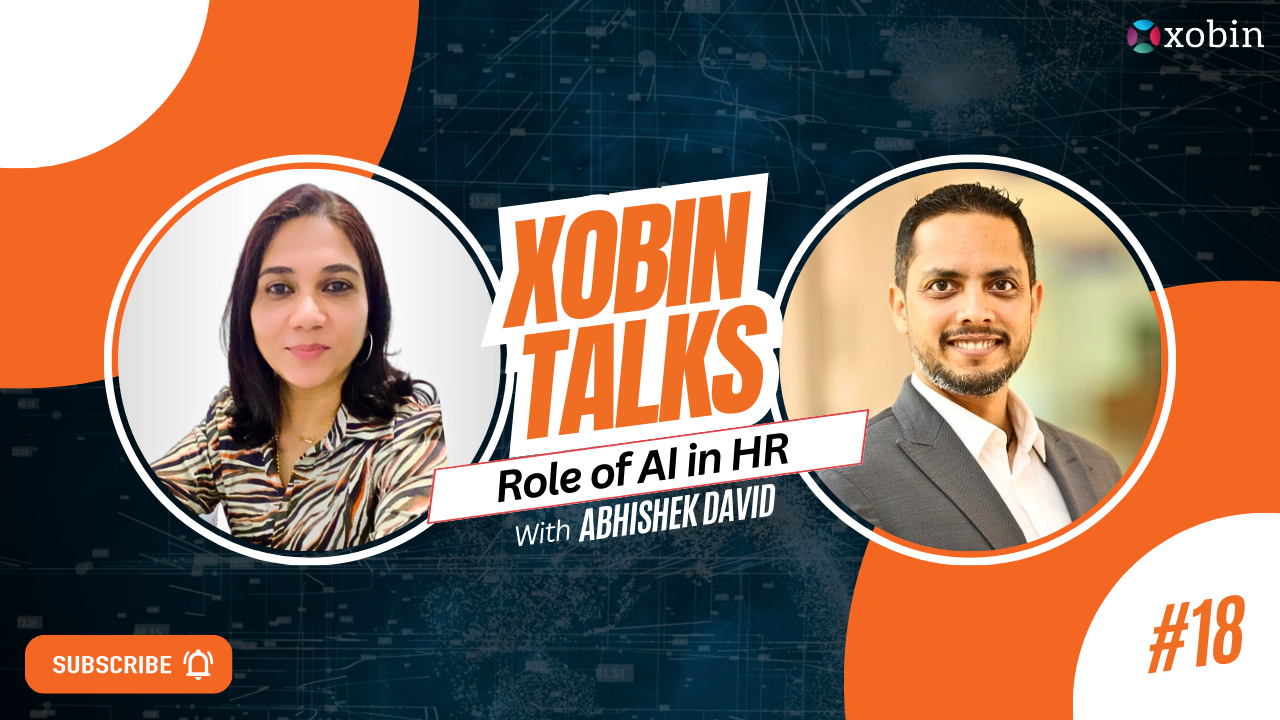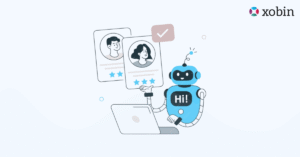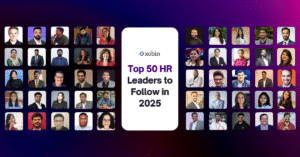Welcome to another episode of Xobin Talks 3.0 – Episode 18! We are thrilled to present thoughtful insights from our latest episode on the role of AI in HR with an evolving future of work and its sustainability. In our Xobin talks, we invite distinguished guests from the HR tech and talent acquisition domains. These experts and researchers share their valuable insights, helping HR teams and organizations thrive.
In this episode, we interacted with Abhishek David, who enlightened us on the questions surrounding the “Role of AI in HR.” As a Doctoral Research Student at the Indian School of Business and an NUS Alumnus, he brings a wealth of knowledge. Notably, Abhishek is a thought leader in HR, specializing in HR digital transformation, talent retention, and culture and change management. Additionally, his expertise extends to HR strategy and dynamic business partnerships.
Despite wearing many hats, his focus always returns to one goal: making it easier for organizations to run their businesses smoothly. Stay tuned as Abhishek shared his expertise and valuable tips in this engaging Xobin Talks—an HR podcast!
Table of Contents
As a researcher in the domain, can you share some successful case studies where AI has significantly improved HR functions?
As a researcher in AI in HR, I have several case studies that exemplify how AI can significantly enhance HR functions.
Unilever’s AI-Powered Recruitment Process
Notable among these is Unilever’s AI-powered recruitment process, which streamlined the hiring procedure and dramatically reduced the time taken to bring new employees on board. By utilizing AI for resume screening, initial interviews, and candidate assessment through online games and video interviews, Unilever minimized human bias and improved diversity, cutting the recruitment time from four months to two weeks.
Hilton’s AI Chatbot for Candidate Engagement
Similarly, Hilton’s AI chatbot, Connie, has revolutionized candidate engagement. This chatbot efficiently handles the high volume of inquiries from potential candidates, providing instant responses and improving candidate satisfaction. As a result, Hilton’s HR staff can focus more on strategic tasks, leading to a more efficient recruitment process.
IBM’s Watson for Employee Engagement and Retention
IBM’s use of its AI platform, Watson, to analyze employee sentiment is another prime example. By sifting through surveys, emails, and social media, Watson provides insights that help improve morale and reduce turnover rates, enhancing employee engagement and retention.
Vodafone’s AI-Driven Performance Management
Vodafone’s AI-driven performance management system has made the performance evaluation process more objective and data-driven. AI algorithms analyze employee performance data, provide personalized feedback, and recommend development opportunities, resulting in more accurate evaluations and increased employee satisfaction.
H&M’s AI-Powered Workforce Planning
H&M’s use of AI for workforce planning optimizes staffing levels by analyzing sales data, foot traffic, and employee schedules, thus improving workforce efficiency, reducing labor costs, and enhancing customer service.
How can organizations balance the benefits of AI with the ethical considerations surrounding data privacy and bias?
Organizations must adopt both direct and indirect measures to harness AI’s benefits while addressing ethical considerations such as data privacy and bias.
Organization’s Direct Balance
- Comprehensive AI Ethics Framework: Developing a comprehensive AI ethics framework is essential. Establishing clear guidelines and ethics committees can ensure adherence to ethical standards.
- Transparency and Explainability: Ensuring transparency and explainability in AI algorithms and clear communication about AI tools and data collection can foster employee trust.
- Data Privacy Measures: Implementing robust data privacy measures, such as anonymizing data and ensuring secure storage in compliance with regulations like GDPR and CCPA, is crucial.
- Monitor and Evaluate AI Impact: Continuous monitoring and impact assessments of AI tools help evaluate their effects on HR processes and outcomes.
- Responsible AI Technologies: Selecting ethical AI vendors and fair algorithms can ensure responsible AI use.
Organization’s Indirect balance
- Mitigate Bias in AI Systems: Use diverse data sets, perform regular audits, and involve diverse teams in AI design to mitigate bias in AI systems.
- Provide Training and Education: Providing AI literacy and ethics training to HR professionals and employees ensures they understand and effectively use AI tools.
- Empower Human Oversight: Maintaining human oversight through a human-in-the-loop approach and providing mechanisms for employees to appeal AI-driven decisions are also critical.
- Foster a Culture of Responsibility: Fostering a culture of responsibility by establishing accountability for AI-related decisions and creating feedback loops for continuous improvement is essential.
- Engage with Stakeholders: It includes employees and external experts and can help ensure best practices in AI implementation. Involving employees in AI discussions can also address their concerns and foster a sense of inclusion.
What emerging AI technologies do you think will have the most significant impact on HR?
Several emerging AI technologies are poised to impact HR significantly.
- Natural Language Processing (NLP): It enables chatbots and virtual assistants to manage HR tasks and conduct sentiment analysis.
- Machine Learning and Predictive Analytics: They are transforming talent acquisition and employee retention processes.
- Computer Vision: It enhances video interviews and resume parsing.
- Robotic Process Automation (RPA): It automates administrative tasks
- Generative AI: It aids in content creation and personalized learning.
- Emotion AI: It provides insights into engagement metrics and employee well-being
- Blockchain: It ensures secure employee records and credential verification.
- AI-driven talent marketplaces: They facilitate internal mobility and manage gig and freelance work.
- Voice assistants: They support HR tasks via HR assistance/Support
- Augmented Reality (AR) and Virtual Reality (VR): AR and VR enhance training, development, and remote work collaboration.
- Ethical AI tools: These tools detect and mitigate bias, ensuring AI systems operate fairly.
From your experience, what are the common misconceptions about AI in HR? How can HR professionals ensure they are leveraging AI tools to their full potential without replacing the human element?
Common Misconceptions
Despite the potential of AI, several misconceptions persist.
- AI Will Replace HR Jobs
- AI is a One-Size-Fits-All Solution
- AI Implementation is Quick and Easy
- AI Can Make Perfect Decisions
- AI is Completely Unbiased
Ensuring Effective Use of AI While Preserving the Human Element
- HR professionals oversee and validate AI-driven decisions.
- Use AI to augment and enhance HR functions/processes, ensuring focus on augmentation, not replacement.
- HR professionals should focus on strategic and interpersonal aspects.
- Continuous Training and Development is necessary tounderstand and effectively use AI tools.
- Select and customize AI tools to fit the organization’s specific needs and culture rather than relying on generic solutions.
- Transparent and Explainable AI
- Regular Audits and Bias Checks ensure they operate fairly and accurately.
- Emphasize Data Privacy and Security to protect employee information and comply with regulations.
- Encourage Employee Feedback on AI-driven processes and voice concerns about potential issues.
- Ethical Use of AI
- Combine AI insights with human judgment to make well-rounded decisions.
What long-term impact do you think AI will have on organizational culture and employee well-being?
The long-term impact of AI on organizational culture and employee well-being is significant.
Positive Impacts
- Enhanced Employee Experience: Personalized learning and development opportunities and Supportive tools like chatbots and virtual assistants.
- Improved Work-Life Balance: Automation of routine tasks & Facilitation of remote work and flexible schedules.
- Proactive Employee Well-Being: Health monitoring for early intervention & Access to mental health support resources (ethical use of data).
- Informed Decision-Making: Data-driven insights into employee sentiment, engagement, and performance & Predictive analytics for proactive measures.
- Enhanced Diversity and Inclusion: Identification and mitigation of biases and Diverse hiring practices.
Potential Challenges Must be Addressed
- Risk of Over-Reliance on Technology: Reduced human interaction & Impersonal HR processes.
- Privacy Concerns: Data security issues & Employee discomfort with surveillance.
- Bias and Fairness Issues: Algorithmic bias perpetuating unfair treatment & Lack of transparency in AI decisions.
- Job Displacement and Reskilling Needs: Potential job losses due to automation & Continuous reskilling requirements.
A Balanced Approach
- Maintain Human-Centric Approach
- Promote Transparency and Trust
- Ensure Data Privacy and Ethics
- Focus on Continuous Learning
- Monitor and Address Bias
“AI enhances rather than undermines the human experience in HR”






